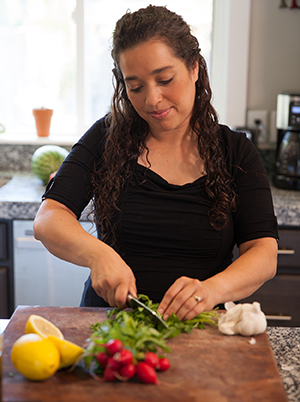Healthy Weight Loss After Pregnancy
As a new mom, you’re busy taking care of your baby. But you also need to take care of yourself. That includes getting back to a healthy weight. Eating healthy and being physically active can get you back in shape. But don’t rush it. Take it slowly. Read on to learn how to safely lose your pregnancy weight.
Weight loss after baby
Right after you give birth, you will lose about 10 pounds. This includes the weight of the baby. It also includes the placenta and amniotic fluid. Many women lose a little more weight soon after that.
You may be eager to lose all of your pregnancy weight. But don’t try to do that quickly. And don’t start cutting calories. Your body has been through major changes with pregnancy and birth. It needs vital nutrients now. This is especially important if you’re breastfeeding. Nursing moms who lose weight too fast can reduce their milk supply.
It’s best to take things slowly. For healthy weight loss, aim to lose about 1 to 2 pounds a week. Eating healthy foods and being active are the safest ways to do it.
Eating healthy
Talk with your health care provider. They can advise you on a healthy eating plan that’s right for you. Stick with a well-balanced diet. This will boost your energy level. And it will give you the nutrients you and your baby need.

In general:
-
Choose lean proteins, high-fiber foods, and whole grains.
-
Eat a mix of fruits and vegetables each day.
-
Limit sweets and fatty or fried foods.
-
Drink plenty of water. Don’t fill up on juice and soda.
-
Limit alcohol. If you are nursing, don’t drink alcohol.
Getting active
When can you start being active again? It’s always best to talk with your health care provider first. But if you had a healthy pregnancy and a vaginal birth with no problems, you can likely do light exercise a few days after delivery. Or as soon as you feel ready.
If you had a Cesarean section, or your vaginal delivery was complicated, talk with your provider. Your body needs some time to heal. You will likely need to wait 4 to 6 weeks.
After your provider says it’s okay:
-
Start slowly. Don’t overdo it. Walking is great for new moms. So is swimming.
-
Try to exercise 20 to 30 minutes on most days of the week. It may be easier to break this up into shorter amounts of time.
-
Over time, aim for at least 150 minutes of moderate-intensity aerobic activity each week.
-
Add in muscle-strengthening exercises with your provider’s approval. These include Kegel exercises, yoga, and Pilates.
-
Drink plenty of water before, during, and after exercising.
-
Stop right away if you feel pain when exercising.
When you are breastfeeding
Breastfeeding has many benefits for your baby and for you. It can even help you lose the weight you gained in pregnancy.
Nursing moms have special nutritional needs. You’ll need about 400 more calories from healthy foods each day than you did before pregnancy. This will help you keep up a good milk supply. But breastfeeding also burns calories. And it triggers the release of a hormone that makes the uterus contract. The uterus then goes back to its normal size more quickly. This can help you lose pregnancy weight a bit faster.
The exact number of added calories you need when breastfeeding will depend on:
-
How active you are.
-
Your age.
-
Your body mass index (BMI).
-
If you are breastfeeding only.
-
If you are breastfeeding and formula feeding.
Talk with your health care provider to find out how many added calories you need. You can also find a helpful MyPlate Planfor breastfeeding moms.
Being overweight before baby
If you were overweight before your pregnancy, it can be harder to lose your pregnancy weight. And it raises your risk for long-term (chronic) obesity. This can then lead to other conditions, such as diabetes and heart disease.
Talk with your health care provider. They can help you come up with a healthy eating and exercise plan. Your provider may also refer you to a nutritionist. Sticking to healthy habits will help you reach a good weight.
When to contact your doctor
Contact your health care provider right away if any of the following occur:
-
You have new symptoms.
-
Symptoms get worse.